• Home • Barg/Bark/Barke Photo's •
Barg/Bark/Barke
To view the Barg/Bark/Barke Photo's or the List of
Names, please select the link at the top of the page.
As of January 2015, the Barg/Bark/Barke
Family history has been officially updated:
Bark Family
Tree
Bark
List of Names
To view the Family Tree or List of Names you will need a PDF
Reader such as Adobe Acrobat. Please download a free copy of the Acrobat Reader
from the
Adobe
Website
Bark Family
Tree
Bark
List of Names
admin1@bjbark.com
Our cousin Harry Adler has been graciously providing to me invaluable
information within the past couple of months. Obviously fresh eyes doing this
research seems to uncover plenty more information. So here is what I now know
thank to Harry.
Ber Barg, most likely was born in the
Radyvyliv /(Radzivilov)
area of Russia sometime in the 1790's. He had two sons that we know of, Itzik
Barg (b. 1819) and Mendel (b. 1831). Looks like Mendel ended up in the Tsar's
Army according to the 1850 Russian census. Itzik Bărg (born circa.
1819, died circa 1890) was married to a woman named Hannah (Hannah died June 1900), they had three children who we know of. Family members are all
descendent of one of these children. The oldest was Ada who married Benjamin Adler, Then
Yachad (Yetta?) who married Beryle Steinberg and then came Moshe Aryeh.
All of the Adler, Barg, and Steinberg descendants are from these three people.
I found the following name definition at another persons web site. |
THE BARG NAME
"Bărg
is the Yiddish-German word for Mountain and is found in many German Place Names either as Bărg or as Berg. Phonetically the word Bărg is related to the name Baruch (Borech in Ashkenazi Yiddish accent) referring to the son of Neriah cited
in the Book of Jeremiah. Baruch means "The Blessed" and
interesting enough in the Bărg family there are several Zelig
(Zelik) which is the german word for "The Blessed". On the other hand, according
to the Museum of Diaspora computerized data and a familiar tradition, Bărg
might have been originally an acronym formed by the first letters of BAr Rabeinu Gershom
(son of our Rabbi Gershom) meaning Rabeinu Gershom bar Yehuda
(HARAGMA) "The Light of the Diaspora", the most
famous and important Rabbinical Figure in the Middle Ages who was born in Mainz (Germany)
circa 960 and died circa 1028. We cannot rule out that the origin of the name is an
allusion to a mountain in general or to one of the two special "Mountains" in
Judaism ( Mt Sinai were the Ten Commandments were given and Mt Moriah were the Temple
stood in Jerusalem). And last, we cannot be sure all Bărgs are related more than other
Jews among themselves since some of us might have inherited the name from one origin and
others from a different Source. Some Bărgs changed their names to adapt it to their
country of residence and have became Bergs Barks Barcks Baraks etc." |
Additional information from Dr. (Rebbe) Nathan Bark @ Barg/Bark spelling:
Boruch (Barney) Barg/Bark's passport (which is rare due to the fact that the locality
was only part of Poland between the two world wars) has Barg spelled beit aleph raish
gimmel. Nathan Bark remembers that it was Gershen who started to spell the name beit raish
final-kopf. Again the mystery of the adding of the 'E' onto the name continues. Bark in
Hebrew means "lightning".
In searching for the Barg/Bark/Barke Brothers and
sisters, I have checked with the Ellis Island web
site. The only two people I can find are Boruch Barg (Bark) and Golda (Goldie) Barg
(Bark). I believe that since Ada Adler was instrumential in having her nephews emigrate to
the USA, I am now trying to centralize my search to the Point Locust terminal in Baltimore
as a point of entry. This is where the Lloyd Line operated between Baltimore and Bremen,
Germany.
The Bark Story
Ber Barg, most likely was born in the
Radyvyliv /(Radzivilov)
area of Russia sometime in the 1790's. He had two sons that we know of, Itzik
Barg (b. 1819) and Mendel (b. 1831). Looks like Mendel ended up in the Czar's
Army according to the 1850 Russian census. Itzik Bărg (born circa.
1819, died circa 1890) was married to a woman named Hannah (Hannah died June 1900), they had three children who we know of. Family members are all
descendent of one of these children. The oldest was Ada who married Benjamin Adler, Then
Yachad (Yetta?) who I think married Beryle Steinberg and then came Moshe Aryeh.
All of the Adler, Barg, and Steinberg descendants are from these three people. (information
provided by Harry Adler)
What is known about the Bark’s is not well documented especially what life was
like in the old country. In searching many documents and databases, I have not been able
to find any references to the Bark’s who lived in the Horochow/Lutsk - Vilna area of
the Ukraine. There are other Bark’s and Barg’s, but I could not find any link to
an Itzik (Isaac) or Hannah Barg, who would have been born about 1830, nor references to
their children (Ada & Moshe Aryeh) that we are all descended from.
Boruch Barg, my Grandfather and namesake, had told my father (Marvin L. Bark) that his
father Moshe Aryeh was a "Lanier" in the local Shul. But the town that he lived
in had twenty-five Shuls in it, so which shul was it? "Lanier" is the reader, as
well as a caretaker of the Torah’s and prayer books, prayer Tallis’s. In
today’s modern shul this person would be the SEXTON of the shul.
Moshe Aryeh died during the great famine November, 1917.
The eldest son of Moshe Aryeh and Channa was Gershen. Gershen was born in 1880,
and died April 12, 1942. He married Sarah Fader (fathers name was Isaac Fader) who was
born in 1882 and died September 22, 1956. He came to America on the S.S.
Breslau arriving on November 11, 1904 from Bremen Germany. He used an alias of
Harry Bark after arriving in the USA.
A daughter named Gittel was born about 1885. She emigrated to the USA with
her oldest brother Gershen on the S.S. Breslau arriving on November 11, 1904
from Bremen Germany. We know that she died early after arrival and was buried in
a paupers grave at the Baltimore Hebrew Friendship Cemetery on Pulaski Hwy. (information
provided by Harry Adler)
The second son of Moshe Aryeh and Channa was Simon (Shia) Simon was born in 1886 and
died February 10, 1928. He married Ida Schenker (fathers name was Shimon David Schenker)
who was born in 1885 and died November 30, 1942.
The third son of Moshe Aryeh and Channa was Isadore, who was named after Moshe
Aryeh’s father. Isadore was born 1894 and died April 13, 1951 (nine years and one day
after his brother Gershen). He married Goldie Garbazg. (Fathers name was Samuel Garbazg)
who was born 1894, and died March 15, 1945.
The fourth son of Moshe Aryeh and Channa was Boruch (Benjamin/Barney). He was born
January 23, 1900 in Horochow (Horchiv/Gorokhov, Ukraine) and died August 27, 1959
(Baltimore, MD). He married Ida Kasnett (Kosnesky) (father’s name was Benjamin
Kosnesky) who was born January 16, 1904 and died March 27, 1998.
Boruch was drafted into the Czar's Army in 1914. When he was asked about his time in
the Army during the Great War, he told his son Marvin, "Yes, I was in the Army, but
one day I went home." (Again we speculate that when the Bulsheviks took command of
the ranks, they sent everyone home, so Boruch just went home. I have found
evidence that during the period of Soviet socialist Revolution in Russia, that
many officers were lynched or shot outright by the Soviets. At that time the
troops were told to lay down their rifles and go home. So Boruch just did what
he was told to do, and went home.)
Boruch arrived at Ellis Island on July 4, 1921(Boruch escorted his Sister-In-Law Goldie
over to America on the same ships.). He was held for future examination for medical
reasons until the next day when he was allowed to enter the USA. He made his way to
Baltimore and was taken in by his first cousin Morris (Muttie) Adler. According to Nathan
Bark, Ada Adler got everyone jobs. So Boruch ended up working at Fox’s Pocketbook
Factory. According to my Grandmother Ida, who had been working there for several years
before Boruch did, she knew the three other Bark Brothers. I know Isadore had worked there
too, so she could have met them through him. Boruch and Goldie arrived on these shores on
the Ship Cedric. Below is a picture of the Cedric.
 The Ship Cedric, Built by Harlan & Wolff Limited, Belfast,
Northern Ireland, 1902. 21035
gross tons; 700 (bp) feet long; 75 feet wide.
Steam quadruple expansion engines, twin
screw. Service speed 16 knots. 2875
passengers ( 365 first class, 160 second class, 2350 third class ). Built for White Star
and Dominion Lines, in 1902 and named
Cedric. Liverpool-New York service. Used as an
auxiliary cruiser and then as a a Troopship during World War I. Scrapped in 1932.
The Ship Cedric, Built by Harlan & Wolff Limited, Belfast,
Northern Ireland, 1902. 21035
gross tons; 700 (bp) feet long; 75 feet wide.
Steam quadruple expansion engines, twin
screw. Service speed 16 knots. 2875
passengers ( 365 first class, 160 second class, 2350 third class ). Built for White Star
and Dominion Lines, in 1902 and named
Cedric. Liverpool-New York service. Used as an
auxiliary cruiser and then as a a Troopship during World War I. Scrapped in 1932.
Ida and Boruch were married in June 1929, and started to open their own little corner
food store. In 1934 the Barks moved to what was then South Washington. They bought a piece
of property and opened a store. Due to the depression, they could not make a decent
living, so they packed up and came back to Baltimore. Sometime later they moved to
Annapolis. I’ve included a short story written by my father in May 1997.
The Grocery Life (Life in a Mom and Pop Store)
I recently saw a History Channel Program on Jewish Mom and
Pop grocery stores of Washington, DC. This program was so reminiscent of the life my
parents lived during those years following the Depression through World War 11 and beyond.
I feel that I must document for their descendants those days long past. The stores my
Parents owned were always in Black Communities. These areas were usually in the poorer
parts of town. The storeowners operated their stores with the help of spouses and their
children when time allowed in between school hours and Hebrew School.
The store was open seven days a week. The workday often was
10 to 12 hours in length. Vacations where something someone else did. Your day off was
Rosh Hashanah and Yom Kippur.
My earliest recollection goes back to the store my Parents
operated in Annapolis, MD (1935). It was on Northwest Street and we lived behind the
store. There was a kitchen heated with oil stove several bedrooms and a bath upstairs. In
this setting Ida and Barney worked day and night and my Mother still had time for both
Bena and myself You operated your store during the hours that the A&P was closed. For
they depended on the small sale "one of these or one of those." You had to
extend credit to the best customers and on the whole most of them were honest hard working
people. They were Black and kept to their ghetto for the most part. There was still a
great deal of prejudice *in those days. I can still remember a few of them to this day:
Albert Byers, Miss Carrie and the Cully family. They paid their bills when they had money,
but there were times you needed to give a bit more time. My Parents kept a large ledger
book and each credit customer had his own little credit book. Entries where made for each
purchase and at the end of the week, it was totaled either they paid in full or left a
balance. I guess the trick was to keep the balance at a manageable amount. For it was not
uncommon for the customer to sometimes move. I presume my Parents lost a great deal of
money operating a business in this manner.
There was no such thing as self-service most of the stock
was behind counters and Mom and Pop were constantly on the move. It was no wonder they
always complained that their feet hurt If business was slow Dad would close early and we
would go for a ride in the Maryland countryside or drive to Severna Park and visit Sara
Strausse's farm Many times Mom, Bena and I would go to Baltimore.
On a Sunday and Dad stayed in the store. He would pay Buck
Cully to drive us. Buck would sit in Bubbe's house as if he were part of the family.
Another day trip to Baltimore was to shop for school clothes we would take the train to
Baltimore's Camden Station and walk up Howard street to the May Co. Hochschild-Kohn
stores. At the end of shopping for the day, Mom would take us to Lee Gaim Yu Chinese
Restaurant for chow mein. Then we would hurry down Eutaw Street to the station and catch
the return train to Annapolis. Ida and Barney's main relaxation was the weekly Sunday
night poker game; they truly looked forward to these Sunday socials with other Annapolis
Mom and Pop storekeepers. On very rare occasions Dad would close very early on a Sunday
and we would go to Baltimore or even Washington to visit family. I do not believe any of
my father's relatives knew how to drive and if they did they were not car owners. There
were weekends that Simi, Yankel (Jake) Bark or Sarah Dannenberg would come to town and
sort of baby-sit Bena and me. At the start of W.W. II we moved from Annapolis to the
Curtis Bay area in Baltimore. I presume our parent’s thought this would be a boom
town so close to the shipyards and steel mills. Everything seemed to be going fine, until
business dropped. This area was heavily populated with Poles and other Slavic people that
when they discovered we were Jewish, we were like boycotted.
Dad went to work in the shipyards as a pipefitter and Mom
ran the store. It was at time that a Paul Tuterow, a carpenter from North Carolina
happened to stop in the store. He had just come from the personnel office and wanted to
buy something for lunch. he liked it so much he stayed as a border for several years until
he married. As the war neared its' end Dad left the shipyard and we moved again this time
to West Baltimore, 1049 N. Mount Street.
This was a very busy store and it required all of us to run
it. My main function was to manage the soda empties and to keep the Coca-Cola box full and
iced. Bena was good at cutting luncheon meats and other duties. Mom and Dad had enough on
their hands just running the other normal duties of grocery people. My how I used to hate
when orders from the Wholesalers came in, once we unpacked what was needed the remainder
had to be stored on the second and third floors. It was quite a schlepp, or the storing of
bags of coal in the basement along with bundles of wood. Pop always liked to have a good
supply in for winter so he bought in the summer when the price was down. The hours here
were also long and the same format was in place. On Sundays the store was usually closed
by noon.
About this time in 1944 Aunt E's husband Henry Davis dies
and my Parents took it upon themselves to look after Benny and Cissie while my Aunt
worked. They were picked up at home and driven to school and at the end of the school day
brought to Mount St. Where they were fed and waited until Aunt E came home from work. My
Mother had the extra burden of cooking for three other people and Barney was the
chauffeur. Aunt E was also selling insurance in her spare tune to augment her income. She
was selling for her Brother's-in-Law the Davis boys, but they never offered to pick her up
*in the Black neighborhoods where she did a great deal of business. She had no problem
calling my Father no matter the time of day. The Davis Brothers never offered her a job
with the firm.
In May 1945 Jerry was born so this put an added
responsibility on Bena and me. One of us was always diapering, feeding or playing with
him. When we were free of our schoolwork. Mom also had domestic help, Mattle Byrd was with
us for a number of years, and she was quiet woman from South Carolina. I have not seen her
in years; she has to be in her eighties. As Jerry got older he was constantly going with
my Father to the wholesalers or Lombard Street, until he started school. This way Mom
devoted her time to the business and not worry about household chores. Mom, of course, did
all her own cooking, she would stir the pot in between sales.
This little reminiscence of the grocery business continued
on beyond my Father's death, about 1966 when Mom decided it was time to let go.
Marvin Bark, May 27, 1997
Hannah Barg died about October 1900, nine months after Boruch was born. Moshe Aryeh
then married a woman named Perec. Perec Barg is listed as the "Next of Kin in Country
of Origin" for Borach on the Ship’s Passenger List for the "SS CEDRIC"
June 25, 1921.
Perec or Perl had two children. Most likely these were from a pervious marriage. Perec
was not a nice person to Isadore and Boruch and both couldn’t wait to leave the
house. Perec had a daughter named Sarah and a son named Mordechai. Mordechai had sent a
picture of himself to Boruch with an inscription in Yiddish " As a momento for my
brother Boruch, Mordechai Barg" This brother or Great Step-Uncle was another mystery
that never before was known. We knew of Sarah, she had married a man named Tamara. They
had a daughter named Julianna, born February 2, 1933.
Sarah and Julianna were to leave Poland on September 1, 1939 and come to America. That
was the same day Hitler invaded Poland. Sarah was never heard from again, but Julianna was
found alive and had been taken in by a Polish Catholic family during the war. In 1947 the
Red Cross notified her Uncle Barney (Boruch) Bark that she was alive. Barney sent word to
her that he would pay for her trip to America. She refused to leave her new family. That
was the last anyone heard from Julianna.
We know that Sarah perished in Europe with over 6 million fellow Jews. But Mordechai is
another Bark/Barke mystery. We think that Mordechai may have emigrated to the
USA before the war and died here in the USA. Typical of Bark/Barke's behavior is
that to never mention a name of someone once they are dead. I am speculating that
Mordechai was dead before the Second World War because no one currently
has ever heard of him. But Sarah
was known to quite a few members of the family.

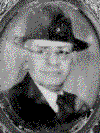
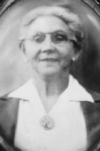
Gershen and Sarah Bark's Tombstone
Gershen Bark
Sarah Bark

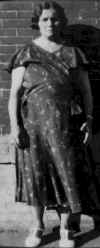
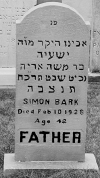
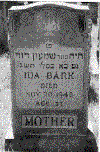
Simon Bark
Ida
Bark
Simon Bark's
Tombstone Ida Bark's Tombstone
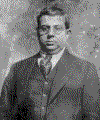
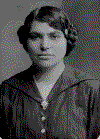

Isadore Bark
Goldie Bark
Isadore and
Goldie Bark's Tombstone
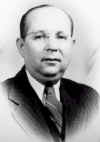
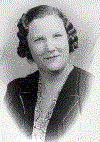

Boruch Bark(Benjamin/Barney)
Ida (Kosnesky) Bark
Benjamin and Ida (Kosnesky)
Bark's Tombstone
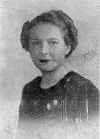

Sarah Barg (Stepsister)
Mordechai Barg (Step Brother)
Copyright 2010 Benjamin J. Bark. All
Rights Reserved. Electronic redistribution of any part of this website is
permitted as long as no alterations are made to the text and this notice appears
at the beginning. Print reproductions for profit or use of this information for
profit is not authorized without permission from the author.
 The Ship Cedric, Built by Harlan & Wolff Limited, Belfast,
Northern Ireland, 1902. 21035
gross tons; 700 (bp) feet long; 75 feet wide.
Steam quadruple expansion engines, twin
screw. Service speed 16 knots. 2875
passengers ( 365 first class, 160 second class, 2350 third class ). Built for White Star
and Dominion Lines, in 1902 and named
Cedric. Liverpool-New York service. Used as an
auxiliary cruiser and then as a a Troopship during World War I. Scrapped in 1932.
The Ship Cedric, Built by Harlan & Wolff Limited, Belfast,
Northern Ireland, 1902. 21035
gross tons; 700 (bp) feet long; 75 feet wide.
Steam quadruple expansion engines, twin
screw. Service speed 16 knots. 2875
passengers ( 365 first class, 160 second class, 2350 third class ). Built for White Star
and Dominion Lines, in 1902 and named
Cedric. Liverpool-New York service. Used as an
auxiliary cruiser and then as a a Troopship during World War I. Scrapped in 1932.













